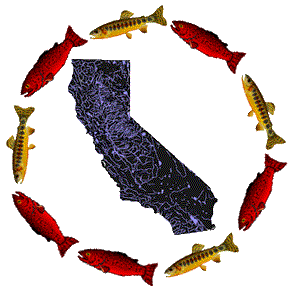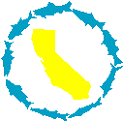|
CSPA |
| Your 501(c)(3) tax deductible cash donations are desperately needed if the fight for our fisheries is to continue. Read how you can donate! |
|
For Email Marketing you can trust
|

 More
News
More
News
![]()
 The "Water
Wars" debate ended without bloodshed but without any solutions
either
The "Water
Wars" debate ended without bloodshed but without any solutions
either
By Corey Cate, CSPA Executive Secretary
February 5, 2009 -- Fresno CA --The "water wars debate, held
February 4, at Fresno State, played to a full house, with the place
abuzz even before the beginning.
The principals all had the right credentials. The "environmentalist's" panel consisted of Bill Jennings, chairman of the California Sportfishing Protection Alliance, Michael Jackson, board member and counsel to the California Sportfishing Protection Alliance and former counsel to the Regional Council of Rural Counties, and Lloyd Carter, board member of the California Water Impact Network and Revive the San Joaquin and president of California Save Our Streams Council.
The water agencies were represented by Thomas Birmingham, general manager and general counsel of the Westlands Water District, Kole Upton, former chairman of Friant Water Users Authority, and Jim Beck, general manager of Kern County Water Agency.
Dr. Thomas Holyoke, a political science professor at Fresno State, coordinated the event. It's Dr. Holyoke's belief that, ""The single most important public policy problem confronting California's Central Valley today is the availability of water. The declining snowpack in the Sierra Nevada, the falling groundwater table and decisions to restore Chinook salmon in the San Joaquin River and smelt in the Delta will most likely mean considerably less water in the future for Valley agriculture."
The "debate" was presided over by Federal Judge Oliver (Continued)... Wanger, the presiding judge for the Eastern District of California, Wanger has ruled over most of the major water cases recently in the Valley, including the controversy over preserving Delta smelt in the Sacramento Delta.
Judge Wanger was an excellent moderator, gave his two cents as a citizen, commented on the judicial process, insights into the Endangered Species Act and it's limitations (A federal judge can NOT factor economic issues into adjudicating ESA), lamented the need for more federal judges and generally set the civil tone for the 2.5 hours of excellent, reasoned, real verbalization of the problems with water.
The debate table on the stage was set up for addressing the audience, not cross-podium-encounter style.
Surprisingly, the tone of the debate was respectful, not angry nor emotional, although some people probably expected a foodfight. There was no foodfight although a few barbs were exchanged. While the debate lasted over two hours, it seemed there was not enough time allotted in the format to engage in a solid argument. Instead, a lot of historical facts were verbalized, context given and statistics were cited and excellently presented.. Overwhelmingly so. All participants had the right oral skills.
The debate could not help but emphasize that the crunch on water availability to farmers and users of the water projects is real, same was true for the environmentalists. The urge to blame environmentalists for the lack of water was evident on behalf of the water agencies. The urge to blame farmers was equally evident on the part of the environmentalists. However, both groups blamed the government for not doing it's job well, in a timely manner or otherwise.
As a reporter, I was surrounded by people who want to feed the world. The problem is they are having limits put upon them, which they do not understand, nor do they want in general. The legislative process has been singled out as the biggest issue. As readers of Cadillac Desert, we know that to be the case. Legislators have not solved the Delta issues, for a legion of reasons.
The environmentalist were equally disturbed about a delta whose fish populations are crashing, whose water quality is deteriorating and whose very existence is threatened by the excessive pumping taking place and the possibility that even greater amounts of water may be sought in the future. They are exasperated by a state policy that seems to say, agriculture of any kind and at any price, even the price of destroying the greatest estuarine environment on the entire west coast of either North or South America, including all of its historic salmon runs, other fisheries, farming and recreational uses.
Blame was not a big topic between the parties on the stage. Argument over policy was more the case. I have copious notes on the interchange, and the facts as stated, but I thought it best to give you a sense of the debate rather than specifics. However, here are a few:
| Cost of new dams was spoken to be $1400 per acre foot to the user. | |
| The State Water Resources Control Board has granted use of about eight times more water than exists based on average year statistics. | |
| Westlands has not solved drainage issues and still wants to solve them. | |
| Water that is spilled for flood control management is still thought of as water wasted by water agencies and farmers. | |
| The courts are overwhelmed with old cases and growing new cases. | |
| Management by the court is seen as the last resort and is not desired. | |
| The "government" is not solving things but is part of the problem. |
Did the debate solve anything? No, unfortunately the water wars will go on… and on… and on. And the courts will likely become more and more crowded with cases… and cases… and cases. And the government will continue to put forward plans, attempt to construct water conveyances and otherwise try to fill a swimming pool's water needs with only a few dozen buckets of water.
Yes, I know, Mark Twain said it over 140 years ago, "In California, whiskey's for drinkin' and water's for fightin' over."